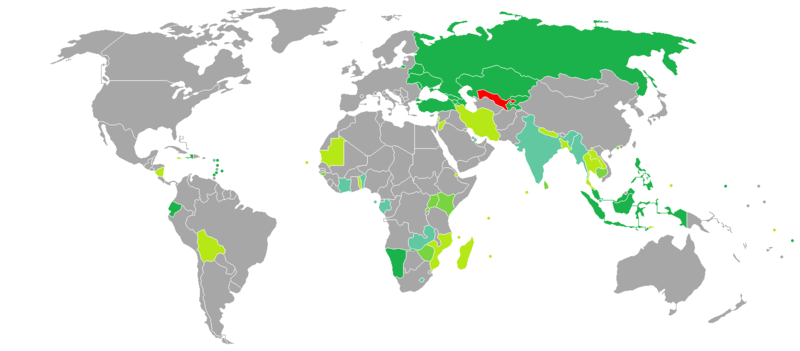Uzbek passport
| Uzbek passport | |
|---|---|
 Front cover of the biometric passport of Uzbekistan | |
| Issued by |
|
| Type of document | Passport |
| Purpose | Identification |
| Eligibility requirements | Uzbek citizenship |
The Uzbek passport, being the property of the Republic of Uzbekistan, is issued to the citizens of Uzbekistan for internal use and international travels. An ordinary passport is issued to a person at 16 years and must be exchanged each 10 years. The passport could also be changed in case of damage or when the bearer of the passport changed his/her name. The passport contains 32 pages for special notes and visas. It is in the Uzbek and English languages. According to bilateral and multilateral agreements, the bearer of the Uzbek passport has the right to travel within Commonwealth of Independent States except neighboring Turkmenistan (Turkmen citizens also required to obtain the Uzbek visa to enter Uzbekistan) and stay up to 90 days without any visa requirements. However, for leaving Uzbekistan, one has to apply for special travel permit in local police. This permit is valid for two years and is needed only for leaving the country—the bearer may stay abroad until the passport is valid.
Since 2010 Uzbekistan has been switching gradually to the biometric passport system. The old (non-biometric) passports are invalid since the beginning of 2016 internationally, but not nationally where are valid till 2018.
Identity information page
The Uzbek passport includes the following data:
- Type('P' for Passport)
- Country code ('UZB' for Uzbekistan)
- Passport number
- First Name
- Last Name
- Place of birth
- Date of birth (in DD-MM-YYYY format, such as 24-12-1988)
- Sex ('M' or 'F')
- Date of issue (in DD-MM-YYYY format)
- Date of expiry (in DD-MM-YYYY format, must be exchanged at the age of 25 and 45 years)
- Issuing office
- Control Number
Visa requirements

As of 1 January 2017, Uzbekistani citizens had visa-free or visa on arrival access to 53 countries and territories, ranking the Uzbekistani passport 83rd in terms of travel freedom (tied with Ivorian, Senegalese, Tajik and Togolese passports) according to the Henley visa restrictions index.[1] However, aside from foreign visa requirements, Uzbekistan is one of the few countries that imposes an exit visa regime on its citizens wishing to leave, and Uzbek citizens need an exit visa from their government for most international travel.
Exit visas
All Uzbek citizens are required to obtain an exit visa to travel to all non-CIS countries. An exit visa is not needed for a trip to a CIS country so long as the traveler does not then go to a non-CIS country. Penalties for traveling to non-CIS countries without an exit visa include heavy fines and prison terms up to 10 years in length. Exit visas are obtained from the Interior Ministry's local OVIR (Office of Visas and Registration), cost $25, and are valid for two years.
Uzbek immigration authorities may not allow Uzbek citizens to board outbound flights without a valid visa for the destination country and/or a return ticket even if the destination country grants visa on arrival to Uzbek passport holders. As a result, Uzbek citizens may have to go to the immigration counter at Tashkent International Airport for an approval and a stamp on their tickets before they proceed to a check-in counter.
The authorities will stop issuing the exit visas starting from January 1, 2019, replacing the current single identity document system with an ID card and a separate passport.[2]
See also
References
- ↑ "Global Ranking - Visa Restriction Index 2017" (PDF). Henley & Partners. Retrieved 14 March 2017.
- ↑ "Постановление Президента Республики Узбекистан № ПП-3126 от 11 июля 2017 года о мерах по коренному совершенствованию деятельности органов внутренних дел в сфере миграционных процессов и оформления гражданства" (in Russian). Uzinfocom. 12 July 2017. Retrieved 14 December 2017.